
Combtooth blennies are blenniiformids; percomorph marine fish of the family Blenniidae, part of the order Blenniiformes. They are the largest family of blennies with around 401 known species in 58 genera. Combtooth blennies are found in tropical and subtropical waters in the Atlantic, Pacific and Indian Oceans; some species are also found in brackish and even freshwater environments.
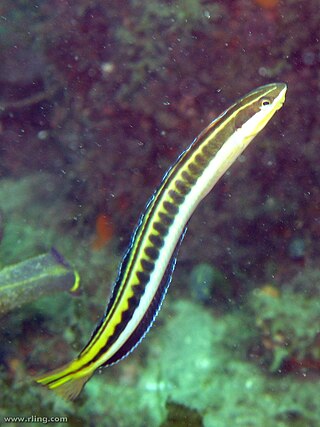
The mimic blenny or piano fangblenny, Plagiotremus tapeinosoma, is a blenny of the genus Plagiotremus, with a widespread Indo-Pacific distribution including New Zealand from depths of 8 to 30 metres. This species reaches a length of 14 centimetres (5.5 in) TL.

Meiacanthus grammistes, the striped blenny, also called the striped fang blenny, grammistes blenny, line-spot harptail blenny or striped poison-fang blenny, is a species of combtooth blenny from the western Pacific Ocean. The fish stays in the open ocean, but travels into shallow saltwater and brackish estuaries. This venomous species occasionally makes its way into the aquarium trade.

Meiacanthus atrodorsalis, the forktail blenny, is a species of combtooth blenny found in coral reefs in the western Pacific ocean. This species grows to a length of 11 centimetres (4.3 in) TL. This venomous species can also be found in the aquarium trade. It is also known as the eyelash harptail-blenny, poison-fang blenny or the yellowtail poison-fang blenny.

Blenniella is a genus of combtooth blennies found in the Pacific and Indian Oceans.

Blenniella chrysospilos, the red-spotted blenny, is a species of combtooth blenny found in coral reefs in the Pacific and Indian oceans.

Blenniella cyanostigma, the striped rockskipper, is a species of combtooth blenny found in coral reefs in the Indian Ocean.

Blenniella gibbifrons, also known as the hump-headed blenny, bullethead rockskipper or picture rockskipper, is a species of combtooth blenny found in coral reefs in the Pacific and Indian Oceans from East Africa in the west to the Hawaiian, Line and Ducie Islands, in the east and north to Marcus Island.
Blenniella interrupta, the dashed-line blenny, is a species of combtooth blenny found in coral reefs in the western Pacific ocean.
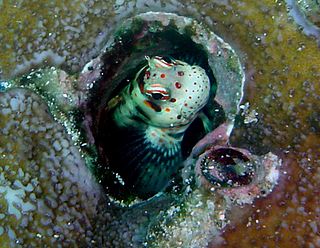
Blenniella periophthalmus is a species of combtooth blenny found in coral reefs in the Pacific and Indian oceans. It is commonly known as the blue-dashed rockskipper, bullethead rockskipper, false rockskipper, or the peppered blenny. B. periophthalmus are oviparous animals and once they lay eggs, the eggs attach to the surface of the sea floor due to an adhesive coating. B. periophthalmus prefer a depth range of 0-3 meters and can have a maximum body length of 10 centimeters.
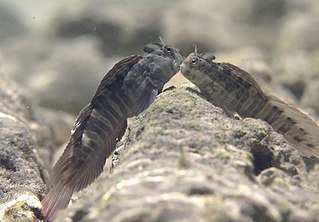
Istiblennius edentulus, the rippled rockskipper, is a species of combtooth blenny found in coral reefs in the Pacific and Indian Oceans. It is also commonly known as the rippled blenny, smooth-lipped blenny, toothless blenny, or coral blenny. Males of this species can reach a maximum of 16 cm (6.3 in) TL, while females can reach a maximum of 13.2 cm (5.2 in) SL.

Istiblennius lineatus, the lined rockskipper, is a species of combtooth blenny found in coral reefs in the Pacific and Indian oceans. It is also commonly known as the lined blenny, black-lined blenny, or thin-lined rockskipper. It can reach a maximum of 15 cm (5.9 in) TL. This species can be found in the aquarium trade.
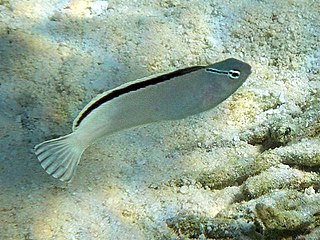
Meiacanthus smithi, the disco blenny, is a species of combtooth blenny found in coral reefs in the eastern Indian ocean. This species grows to a length of 8.5 centimetres (3.3 in) TL. It is also commonly known as Smith's fangblenny, Smith's sawtail blenny or Smith's harp-tail blenny. This species is also found in the aquarium trade.
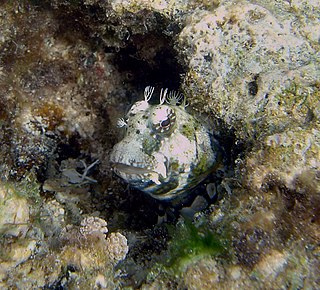
Nannosalarias nativitatis, the pygmy blenny or throatspot blenny, is a species of combtooth blenny found in coral reefs in the western Pacific and Indian oceans. This species grows to a length of 5 centimetres (2.0 in) TL. It is also commonly known as the Christmas blenny or the Christmas Island blenny. This species is the only known member of its genus.
The cheekspot blenny is a species of combtooth blenny found in the western Indian Ocean, in the Persian Gulf, Gulf of Oman and adjacent parts of the Indian Ocean. This species reaches a length of from 6 centimetres (2.4 in) TL.
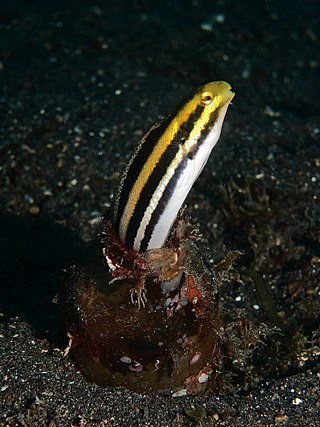
Petroscirtes breviceps, the striped poison-fang blenny mimic, striped fangblenny mimic, short-head sabretooth blenny, short-headed blenny, sabretooth blenny, or the black-banded blenny, is a species of combtooth blenny found in coral reefs in the western Pacific and Indian ocean. This species reaches a length of 11 centimetres (4.3 in) SL.
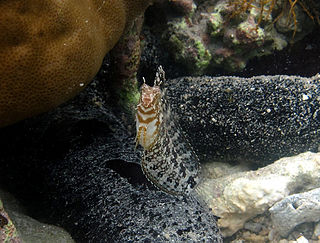
Petroscirtes mitratus, the floral blenny, floral fangblenny, helmeted blenny, or the crested sabretooth blenny, is a species of combtooth blenny found in coral reefs in the Pacific and Indian ocean. This species reaches a length of 8.5 centimetres (3.3 in) TL. It is the type species of the genus Petroscirtes.
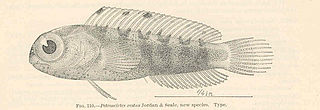
Petroscirtes xestus, the xestus sabretooth blenny, xestus fangblenny, or the bearded sabretooth blenny, is a species of combtooth blenny found in coral reefs in the Pacific and Indian Ocean. This species reaches a length of 7 centimetres (2.8 in) TL.

Xiphasia setifer, the hairtail blenny or the snake blenny, is a species of combtooth blenny found in the western Pacific and Indian Oceans. This species reaches 53 cm (21 in) in SL and is the longest species of combtooth blenny. It can also be found in the aquarium trade.
Emblemariopsis occidentalis, the flagfin blenny, blackfin blenny or redspine blenny, is a species of chaenopsid blenny found around the Bahamas, Brazil, and the Lesser Antilles, in the western Atlantic ocean. Males of this species can reach a maximum length of 1.9 centimetres (0.75 in) SL, while females can reach a maximum length of 1.7 centimetres (0.67 in).
















